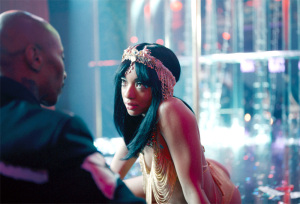

Director Tony Mucci’s film premiered at the Tribeca Fest to critical acclaim. Set against the backdrop of 1981 New York City during Ronald Reagan’s inauguration – a period when urban violence was savage – MONEY TALK$ follows the journey of a single $100 bill passing through the hands of various characters, revealing their economic and moral values.
The film features a superb ensemble cast that includes David Mazouz, Francesca Scorsese, and Fredro Starr. The $100 bill is a potent symbol of power, an object capable of transforming lives in small but significant ways. Mucci depicts money not as inherently evil but as an amplifier of human weakness. For some characters, the bill offers a empowerment, though fleeting; for others, it lays bare their vulnerability. Through their interactions with the bill, Mucci illustrates how money can corrupt, not by force, but by subtly encouraging people to prioritize survival or desire over ethics.
The director’s choice of the Big Apple in 1981 – the metropolis marred by violent crimes and economic hardships – makes it an active character in the film. The gritty, neon-lit streets mirror the inner decay of the people who inhabit them. Each character’s story is a portrait of survival at all costs, underscoring how environment shapes morality. The oppressive atmosphere serves as a visual reminder that in a crumbling society, traditional moral frameworks become luxuries few can afford.
MONEY TALK$ also highlights the paradox of urban life: Profound interconnectedness coupled with deep isolation. Transactions are fleeting, impersonal, and devoid of real human connection. In a capitalist society, according to Mucci, money creates invisible threads that bind people’s lives together, yet fosters emotional disconnection, emphasizing the transactional nature of modern relationships.
Throughout the film, characters face moral decisions that test their integrity – not in not grand, villainous acts but small compromises that gradually erode ethical boundaries. Mucci portrays these choices with empathy, suggesting that the real villain is not the individual but the system that forces such decisions. The film’s refusal to cast clear heroes or villains speaks to the complexity of survival in a flawed society.
MONEY TALK$ employs potent symbolism to reinforce its themes. The $100 bill acts as an impartial observer of human folly, passing judgment without uttering a word. The film’s visual language—gritty textures, neon shadows, and muted color palettes—captures the duality of glamor and decay. The historical backdrop of Reagan’s inauguration, a moment heralded as a new dawn for America, stands in stark contrast to the bleak realities faced by the film’s characters.

the WORD Editor Gregg W. Morris